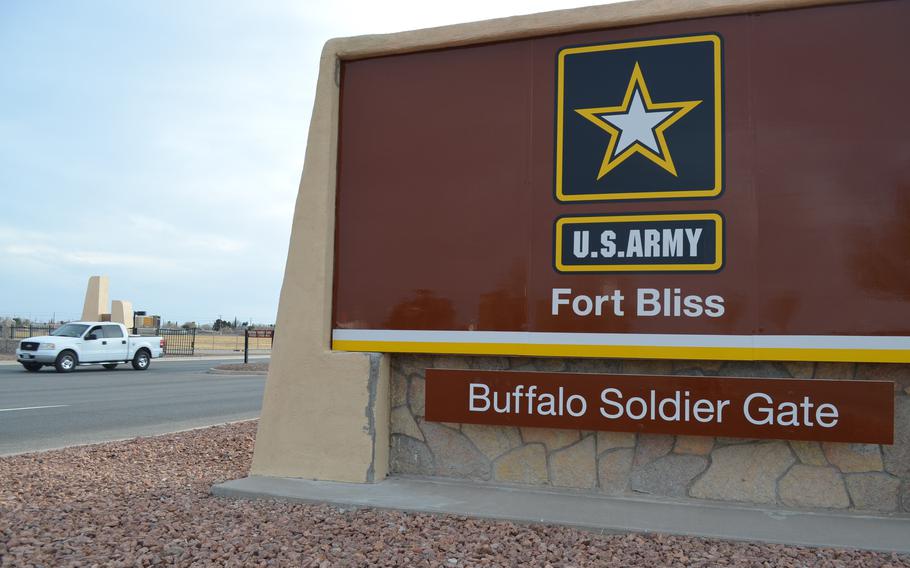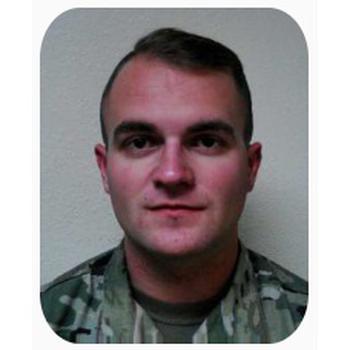
A Fort Bliss soldier was arrested Aug. 6, 2025, after attempting to provide Russia with military combat operations and details on Army tanks that he gained through his top-secret security clearance, according to federal authorities. (Rose L. Thayer/Stars and Stripes)
AUSTIN, Texas — A Fort Bliss soldier was already under criminal investigation when he called a Russian Embassy to share the weaknesses of the U.S. Army’s tanks in exchange for Russian citizenship and a job in the country’s defense operations.
Federal court records for the espionage charges filed against Spc. Taylor Adam Lee, 22, last week did not describe what previous criminal behavior he was accused of or what agency was investigating him. However, Lee disclosed during the FBI’s espionage investigation that his U.S. passport had been taken from him.
The soldier, who enlisted in 2021, now faces charges of attempting to transmit national defense information to a foreign adversary and exporting controlled technical data without a license, according to the U.S. Attorney’s Office for the Western District of Texas.
He was arrested and charged days after delivering a computer he had taken from a tank at Fort Bliss to a storage facility in El Paso. Federal Magistrate Judge Laura Enriquez ordered Monday that Lee remain in jail without bail after prosecutors argued he was a flight risk with a criminal history.
An attorney for Lee declined to comment on the charges against him.

Spc. Taylor Adam Lee, 22, was arrested by the FBI on Aug. 6, 2025, and charged with attempting to provide Russia with information about U.S. Army tanks and operations. (Fort Bliss)
Army Criminal Investigation Division said Friday it has an ongoing investigation into Lee that is separate from the espionage case underway with the FBI and Army Counterintelligence Command. CID did not state when they began to track Lee and if it was their investigation that exposed his phone calls to the Russian Embassy.
The Army declined to comment on whether it was aware of that first investigation, which should have triggered a review of his top-secret security clearance.
“The way the process is supposed to work is everybody should be enrolled in continuous evaluation and continuous monitoring,” said Anthony Kuhn, an Army veteran turned attorney who now specializes in security clearance cases. “Depending on what the criminal investigation is about, and the information contained or uncovered during that investigation, the individual should have been notified that they’re the subject of a criminal investigation and been asked questions about whatever information surfaced.”
The soldier’s unit or the Defense Department can initiate that review, he said.
That first investigation began in October 2024 — nine months after he received a top-secret security clearance to attend school to reclassify from a tank crew member to explosive ordnance disposal, according to court documents. He failed out of EOD school in May 2024 after just two days and returned to Fort Bliss where he was assigned to Bravo Company, 4th Battalion, 70th Armor Regiment within the 1st Armored Division.
Phone records obtained in that investigation showed Lee made three phone calls in May 2025 to phone numbers for the Russian Embassy in Washington, according to court documents.
“To subpoena his phone records and get those records, usually you’re facing a security clearance revocation when that happens,” Kuhn said. “I don’t know if he was in the process, but he certainly should have been.”
The FBI in May opened its investigation to “better understand the purpose of Lee’s outreach to the Russian Embassy,” according to court documents. The FBI declined to comment whether its agents were already involved in the investigation or they were brought in by another agency.
“My colleague give [sic] me this email for possible cooperation,” an undercover FBI agent wrote May 30 to Lee. “What is your interest and how do you wish to work together?”
Lee responded the same day asking who the person represented. Then asked three days later to discuss cooperation. The conversation continued with Lee offering to provide “armored operations information” and “operator experience on the M1 Abrams [tank].”
During the next few weeks, Lee expressed urgency to make the deal because he had tried to be a whistleblower, which he said left his safety in question, according to court documents. He added he had more information on drone platforms, ordnance disposal and psychological operations.
To prove his credentials, he sent the agent a screenshot from his Army Talent Profile, according to court documents.
Throughout the conversations, Lee urged the person he believed to be part of Russia’s military to accept his information quickly because Lee believed he had uncovered human trafficking and criminal activity in the U.S. military. He tried to report the cover ups, which angered someone above him, he said.
“Other soldiers have gone missing or ended up dead,” Lee told the undercover FBI agent.
He demanded citizenship, a Russian passport under the name “Artyom Lee” and a safe way to travel to Russia. His own U.S. passport had been “confiscated,” he said, according to court documents.
After sending the first wave of classified documents about the Abrams tank, Lee said: “I do apologize for my urgency, the USA is not happy with me for trying to expose their weaknesses. ... At this point I’d even volunteer to assist the Russian federation when I’m there in any way.”
.jpg/alternates/LANDSCAPE_910/7718879%201.jpg)
Abrams tanks at the Fort Bliss training complex near Alamogordo, N.M., in March 2023. (U.S. Army photo)
An in-person meeting was scheduled for July 9 in El Paso, where Lee handed an undercover FBI agent a digital storage device known as an SD card that he had hidden in his watch strap. The card held four updated operations manuals for the Abrams tank, several documents related to the Bradley Fighting Vehicle and other manuals for combat operations, according to court documents.
If they wanted more information, Lee said his security clearance would allow him to get any document on tanks. He promised by their next meeting, he would hand over the Joint Battle Command Platform, a computer inside American tanks that is a friendly force tracking system, according to court documents. Once he stole the computer, he would be unable to return to Fort Bliss, he said.
On July 30, Lee told the agent he had the computer.
“Great news for you today, two tanks were damaged and recovered from the field and I have everything needed you requested,” Lee wrote, according to court documents. “And no one knows I have them. They think they got lost out in desert.”
The following day, Lee brought the computer system to a storage unit that he did not know was under FBI control.
“Mission accomplished,” he wrote.
Federal agents arrested Lee on Aug. 6 in El Paso, according to federal court records.
In a two-day hearing held this week in El Paso federal court, Enriquez, the judge for the case, found prosecutors presented enough evidence for the charges against Lee to proceed to a federal grand jury.